|
 Secure Site
Secure Site
|
 |
Archive for the 'sleep' Category
 The Zen Alarm Clock transforms mornings, awakening you gradually with a series of gentle acoustic chimes. Once you use a Zen Clock nothing else will do. They have same brain activity and eye movements as healthy people while sleeping, study finds
Some patients do dream while in a minimally conscious state and are therefore likely to still have a form of consciousness about themselves and the external world, a new study says.
The researchers used electroencephalography (EEG) to compare the structure of sleep in 11 brain-damaged patients — six in a minimally conscious state and five in a vegetative state (unresponsive wakefulness).
“We used as a marker of arousal the fact that the [patient] had his/her eyes open and muscle tone, and as a marker of sleep the fact that the patient had closed eyes and muscle inactivity,” Dr. Steven Laureys, director of the Coma Science Group at the University of Liege in France, said in a university news release.
Electrical activity differed little between sleep and wakefulness in patients in a vegetative state, but the sleep of patients in a minimally conscious state was similar to that of normal sleep in a healthy person, the investigators found.
During sleep, the patients in a minimally conscious state had changes in “slow wave” activity in the front of the brain considered important for learning and brain plasticity. They also had non-rapid eye movement, slow wave sleep and rapid eye movement, which is associated with dreaming.
“Everything thus indicates that they have access to dreaming,” Laureys said. “As a result, we can legitimately suppose that they still have a form of consciousness of self in addition to a certain consciousness of the external world.”
 Waking up in the morning should be as pleasant as falling asleep at night. The Zen Alarm Clock's gradual, gentle awakening is transformative. Boulder, Colorado—an innovative company has taken one of life’s most unpleasant experiences (being startled awake by your alarm clock early Monday morning), and transformed it into something to actually look forward to. “The Zen Alarm Clock,” uses soothing acoustic chimes that awaken users gently and gradually, making waking up a real pleasure. Rather than an artificial recorded sound played through a speaker, the Zen Clock features an alloy chime bar similar to a wind chime. When the clock’s alarm is triggered, its chime produces a long-resonating, beautiful acoustic tone reminiscent of a temple gong. Then, as the ring tone gradually fades away, the clock remains silent until it automatically strikes again three minutes later. The frequency of the chime strikes gradually increase over ten-minutes, eventually striking every five seconds, so they are guaranteed to wake up even the heaviest sleeper. This gentle, ten-minute “progressive awakening” leaves users feeling less groggy, and even helps with dream recall.
The study was published in the August issue of the journal Brain.
More information: The University of Washington has more about vegetative and minimally conscious states. — Robert Preidt
 Wake up with gradual, beautiful acoustic chimes. The Zen Alarm Clock transforms your mornings and gets you started right, with a progressive awakening. Now & Zen – The Chime Alarm Clock Store
1638 Pearl Street
Boulder, CO 80302
(800) 779-6383
orders@now-zen.com
Posted in sleep, Sleep Habits
 How to Choose the Best Alarm Clock, get the Gradual Chime Clock Your body is a temple, so why not wake it respectfully and naturally with the gentle Tibetan bell-like chimes of the Zen alarm clock.
Gradually increasing over a 10-minute period, the chimes help ease you out of sleep and into your day. Not just for waking, the rhythm of the chimes is ideal for use during meditation and affirmation, as well as serving as a subtle signal for meeting times. The simple wood shape and lovely Japanese leaf-embellished dial will bring balance and beauty to either bedrooms or offices.
The Zen Alarm Clocks are decorative, highly functional (as both alarm clocks and timers for yoga and meditation), and environmentally friendly.
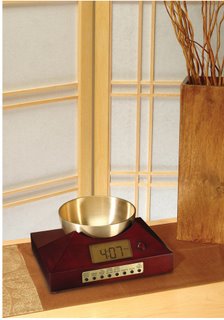 Tibetan-Bowl Gong Alarm Clocks with Natural, Acoustic Sounds Now & Zen Headquarter Store
1638 Pearl Street
Boulder, CO 80302
(800) 779-6383
Posted in Natural Awakening, Now & Zen Alarm Clocks, sleep, Sleep Habits
 Waking up in the morning should be as pleasant as falling asleep at night. The Zen Alarm Clock's gradual, gentle awakening is transformative. Shut-eye helps students integrate and retain information, study finds
Sufficient sleep improves college students’ ability to learn, a new study finds.
The study included 102 university undergraduate students who had never taken an economics course and were given an introductory lecture on supply and demand microeconomics. Those tested on the material after they got adequate sleep over a 12-hour period had better scores than those who took the test after being awake for 12 hours.
The findings show that sleep can help college students retain and integrate new information needed to solve problems on an exam.
“Our findings demonstrate the importance of sleep to the ability to flexibly combine distinct concepts to solve novel problems. This ability is critical to classroom learning,” lead author Michael Scullin, a doctoral candidate in the Behavior, Brain and Cognition program at Washington University in St. Louis, said in an American Academy of Sleep Medicine news release.
The test the students took included two types of problems: “basic” problems, which they had been taught how to solve; and “transfer” problems, which relied on the students being able to solve novel, but related problems using their newly acquired knowledge of supply and demand.
 Wake up with gradual, beautiful acoustic chimes. The Zen Alarm Clock transforms your mornings and gets you started right, with a progressive awakening “The most surprising finding of our study was that sleep, relative to an equal-length wake interval, benefited performance on the novel, ‘transfer’ integration problems without affecting performance on the basic, trained problems,” Scullin said.
The study was to be presented Tuesday at SLEEP 2011, an Associated Professional Sleep Societies meeting in Minneapolis. Research presented at medical meetings is considered preliminary until published in a peer-reviewed medical journal.
Boulder, Colorado—an innovative company has taken one of life’s most unpleasant experiences (being startled awake by your alarm clock early Monday morning), and transformed it into something to actually look forward to. “The Zen Alarm Clock,” uses soothing acoustic chimes that awaken users gently and gradually, making waking up a real pleasure. Rather than an artificial recorded sound played through a speaker, the Zen Clock features an alloy chime bar similar to a wind chime. When the clock’s alarm is triggered, its chime produces a long-resonating, beautiful acoustic tone reminiscent of a temple gong. Then, as the ring tone gradually fades away, the clock remains silent until it automatically strikes again three minutes later. The frequency of the chime strikes gradually increase over ten-minutes, eventually striking every five seconds, so they are guaranteed to wake up even the heaviest sleeper. This gentle, ten-minute “progressive awakening” leaves users feeling less groggy, and even helps with dream recall.
More information: Harvard Medical School has more about sleep. — Robert Preidt
SOURCE: American Academy of Sleep Medicine, news release, June 14, 2011
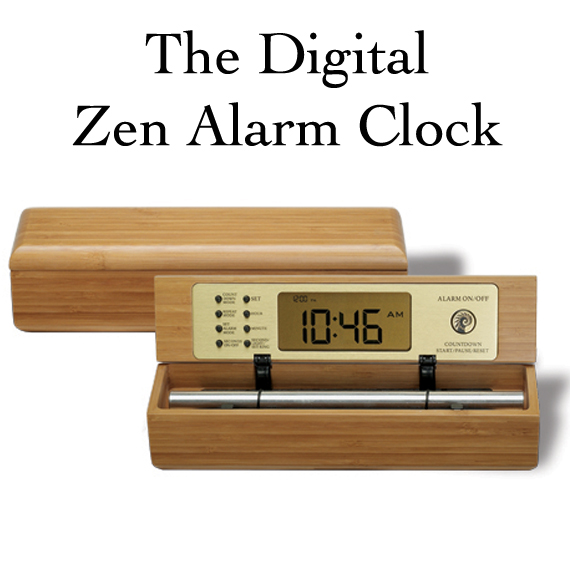 The Zen Alarm Clock transforms mornings, awakening you gradually with a series of gentle acoustic chimes Once you use a Zen Clock nothing else will do Now & Zen – The Acoustic Chime Alarm Clock Shop
1638 Pearl Street
Boulder, CO 80302
(800) 779-6383
orders@now-zen.com
Posted in sleep
 Wake up refreshed, love your alarm clock, transform your mornings with The Zen Alarm Clock's progressive awakening with gentle chimes. Too busy to go to bed? Having trouble getting quality sleep once you do? Your health may be at risk
It’s National Sleep Awareness Week. Before hitting snooze on this news, consider that scheduling a good night’s sleep could be one of the smartest health priorities you set. It’s not just daytime drowsiness you risk when shortchanging yourself on your seven to nine hours. (More than 35 percent of adults routinely clock less than seven hours per night, according to the National Sleep Foundation.) Possible health consequences of getting too little or poor sleep can involve the cardiovascular, endocrine, immune, and nervous systems. In addition to letting life get in the way of good sleep, between 50 and 70 million Americans suffer from a chronic sleep disorder—such as insomnia or sleep apnea—that affects daily functioning and impinges on health. Here’s a look at the research:
1) Less may mean more. Among people who sleep under seven hours a night, the fewer zzzz’s they get, the more obese they tend to be, according to a 2006 Institute of Medicine report. This may relate to the discovery that insufficient sleep appears to tip hunger hormones out of whack. Leptin, which suppresses appetite, is lowered; ghrelin, which stimulates appetite, gets a boost.
2) You’re more apt to make bad food choices. A study published in 2008 in the Journal of Clinical Sleep Medicine found that people with obstructive sleep apnea or other severely disordered breathing while asleep ate a diet higher in cholesterol, protein, total fat, and total saturated fat. Women were especially affected.
3) Diabetes and impaired glucose tolerance, its precursor, may become more likely. A 2005 study published in theArchives of Internal Medicine found that people getting five or fewer hours of sleep each night were 2.5 times more likely to be diabetic, those getting six hours or fewer were 1.7 times more likely.
 Waking up in the morning should be as pleasant as falling asleep at night. The Zen Alarm Clock's gradual, gentle awakening is transformative. 4) The ticker is put at risk. A 2003 study found that heart attacks were 45 percent more likely in women who slept five or fewer hours per night than in those who got more. And a 2008 study in the Journal of the American Medical Association found that too little sleep promotes calcium buildup in the heart arteries, leading to the plaques that can cause heart attacks and strokes.
5) Blood pressure may increase. Obstructive sleep apnea, for example, has been associated with chronically elevated daytime blood pressure, and the more severe the disorder, the more significant the hypertension, suggests the 2006 IOM report. Obesity plays a role in both disorders, so losing weight can ease associated health risks.
6) Auto accidents rise. As stated in a 2007 report in the New England Journal of Medicine, nearly 20 percent of serious car crash injuries involve a sleepy driver—and that’s independent of alcohol use. Sleepiness affects professional drivers, too. The National Sleep Foundation’s 2012 Sleep in America poll, released Saturday, found that 20 percent of airline pilots admit they’ve made a serious error due to lack of sleep, compared with 18 percent of train operators and 14 percent of truck drivers.
7) Balance is off. Older folks who have trouble getting to sleep, who wake up at night, or are drowsy during the day could be 2 to 4.5 times more likely to sustain a fall, found a 2007 study in the Journal of Gerontology.
8) You may be more prone to depression. Adults who chronically operate on fumes report more mental distress, depression, and alcohol use. Adolescents suffer, too: One survey of high school students found similarly high rates of these issues. Middle schoolers, too, report more symptoms of depression and lower self-esteem.
9) You won’t be as nice. In general, sleep loss is likely to negatively affect your mood, causing irritability, impatience, and an inability to concentrate. A 2011 study in the Academy of Management Journal found that a lack of sleep increased deviant and unethical behavior, making people more rude and more likely to respond inappropriately in situations.
10) Your smarts may suffer. Sleep promotes learning, according to the Harvard Women’s Health Watch. It helps the brain commit new information to memory, and researchers have found that people who sleep after learning a task do better on later tests. In 2011, University of London scientists said that getting less than six to eight hours of sleep a night can age your brain by four to seven years—increasing the speed of cognitive decline, and worsening vocabulary and reasoning abilities.
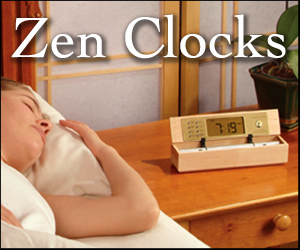 Wake up with gradual, beautiful acoustic chimes. The Zen Alarm Clock transforms your mornings and gets you started right, with a progressive awakening 11) Kids may suffer more behavior problems. Research from a 2008 issue of the Archives of Pediatric and Adolescent Medicine found that children who are plagued by insomnia, short duration of sleeping, or disordered breathing with obesity, for example, are more likely to have behavioral issues like attention deficit hyperactivity disorder.
12) You’ll look better. Beauty sleep is no myth: People are perceived as being less attractive and more unhealthy when they’re sleep-deprived than when they’re well-rested, according to research published in 2012 in the British Medical Journal. Swedish researchers photographed 23 volunteers on two occasions: Once, after getting eight hours of sleep, and again after being kept awake for 31 hours following five hours of sleep. None of the participants wore makeup and all were equally clean-shaven. More than 60 untrained observers rated the photos. Participants were judged to be 4 percent less attractive, 6 percent less healthy, and 19 percent more tired when they were sleep-deprived.
13) Death’s doorstep may be nearer. Those who get five hours or less per night have approximately 15 percent greater risk of dying—regardless of the cause—according to three large population-based studies published in the journals Sleep and the Archives of General Psychiatry.
Boulder, Colorado—an innovative company has taken one of life’s most unpleasant experiences (being startled awake by your alarm clock early Monday morning), and transformed it into something to actually look forward to. “The Zen Alarm Clock,” uses soothing acoustic chimes that awaken users gently and gradually, making waking up a real pleasure. Rather than an artificial recorded sound played through a speaker, the Zen Clock features an alloy chime bar similar to a wind chime. When the clock’s alarm is triggered, its chime produces a long-resonating, beautiful acoustic tone reminiscent of a temple gong. Then, as the ring tone gradually fades away, the clock remains silent until it automatically strikes again three minutes later. The frequency of the chime strikes gradually increase over ten-minutes, eventually striking every five seconds, so they are guaranteed to wake up even the heaviest sleeper. This gentle, ten-minute “progressive awakening” leaves users feeling less groggy, and even helps with dream recall.
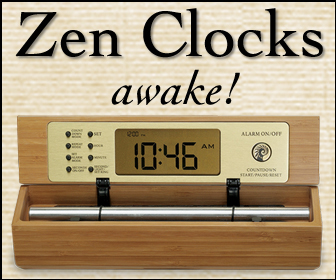 Wake up refreshed, love your alarm clock, transform your mornings with The Zen Alarm Clock's progressive awakening with gentle chimes. By SARAH BALDAUF, ANGELA HAUPT for US News
Now & Zen – The Soothing Chime Alarm Clock Store
1638 Pearl Street
Boulder, CO 80302
(800) 779-6383
orders@now-zen.com
Posted in sleep
 Kitagawa Utamaro, Komuraski of the Tamaya, House After a Bath, 1795 Sure, we all know we’re supposed to get seven or eight hours of sleep a night, but all of us skimp from time to time, getting, say, five hours one night and six hours the next. Those lost hours, though, can add up to a big sleep debt by the end of the week—the reason so many of us feel wiped out by Friday. But here’s a bit of good news: Researchers have found that sleeping in after a few days of missed sleep can help pay back that debt, nearly erasing any lingering sense of fatigue and mental fuzziness, according to a study published in 2010 in the journal Sleep. “The brain has a built-in reflex that helps you sleep deeper and longer when you’re sleep deprived,” says study coauthor David Dinges, chief of the division of sleep and chronobiology at the University of Pennsylvania School of Medicine. “This recovery sleep seems to have a genuine benefit to restoring alertness.”
Think you’re doing fine on only six hours a night? Think again. Although Dinges hears this from folks all the time, he says it’s true for only a small percentage of the population. Most of us actually need seven or eight hours of shut-eye to feel 100 percent the next day. “If you fall asleep watching TV or struggle to stay awake in a meeting,” he says, “you’re sleep deprived.” And it’s not just fatigue you feel but reduced brain function in terms of your memory, alertness, cognitive speed, and reaction time. “Some of us are so used to not getting enough sleep that we’ve forgotten what it feels like to be fully alert,” Dinges adds.
One of the ultimate Zen like experiences is waking-up from a great slumber refreshed and energized. Your mind and body are harmoniously one, both alert and focused. Having a refreshed mind and body are two keys to a natural and Zen lifestyle. Waking up in the morning should not be a loud and abrupt awakening, but rather it should be a peaceful positive experience. The right natural alarm clock can transition your deep and tranquil sleep into a serene start to consciousness. Imagine a long-resonating Tibetan bell-like chime waking you up to a beautiful morning experience.
 Waking up in the morning should be as pleasant as falling asleep at night. The Zen Alarm Clock's gradual, gentle awakening is transformative. The right alarm clock can be the most beneficial investment for you. With our Now & Zen natural alarm clock you are awakened more gradually and thus more naturally. Now & Zen is focused on creating a naturalistic lifestyle, and our clocks are an example of our philosophy.
By ANGELA HAUPT for US News
 Wake up with gradual, beautiful acoustic chimes. The Zen Alarm Clock transforms your mornings and gets you started right, with a progressive awakening Now & Zen – The Soothing Chime Alarm Clocks Shop
1638 Pearl Street
Boulder, CO 80302
(800) 779-6383
orders@now-zen.com
Now
Posted in sleep
 Awaken gradually Dreaming of a Good Night’s Rest
How you awaken each morning can also influence how well you sleep. Some experts believe your body is naturally designed to awaken gradually with the rising sun and should not to be jarred awake by a screaming alarm clock. Dawn simulators recreate a natural sunrise by slowly increasing the intensity of light in the room. A study in BMC Psychiatry found that dawn simulators improved the quality of sleep during winter months for a group of about 80 randomly chosen people.
The right light can also help you fall asleep more easily. Studies have shown that exposure to 2,000- to 10,000-lux light (the equivalent of gazing at the horizon on a sunny day and up to 20 times brighter than normal room lighting) can improve overall sleep quality, says psychiatrist Daniel Kripke, MD, of the University of California, San Diego. This is most beneficial for about 20 to 30 minutes in the morning and a few hours prior to bed. More specifically, light therapy has been used to reset body clocks for those with sleep-timing problems and to correct erratic sleep habits caused by depression. A recent study in the journal Sleep found that evening exposure from a light box effectively treated people who often woke up too early and were unable to fall back to sleep. Exactly how light therapy improves sleep for people with depression remains unknown, Kripke says, but one popular theory is that bright light increases sleep-aiding serotonin levels.
Now & Zen’s Digital Zen Clock’s long-resonating Tibetan bell-like chime makes waking up a beautiful experience – its progressive chimes begin your day with grace. When the clock’s alarm is triggered, the acoustic chime bar is struck just once … 3-1/2 minutes later it strikes again … chime strikes become more frequent over 10 minutes … eventually striking every 5 seconds until shut off. As they become more frequent, the gentle chimes will always wake you up – your body really doesn’t need to be awakened harshly, with a Zen Clock you’re awakened more gradually and thus more naturally. Unlike artificial recorded sounds coming out of a tiny speaker in a plastic box, natural acoustic sounds transform your bedroom or office environment.
adapted from Natural Solutions Magazine, December 2005 by Matthew Sloan
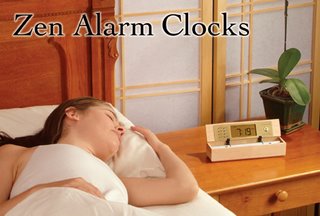 Natural Awakening, Digital Zen Alarm Clock Now & Zen’s Chime Alarm Clock Shop
1638 Pearl Street
Boulder, CO 80302
(800) 779-6383
Posted in Chime Alarm Clocks, Japanese Inspired Zen Clocks, Natural Awakening, Now & Zen Alarm Clocks, Progressive Awakening, sleep, Sleep Habits, wake up alarm clock, Well-being
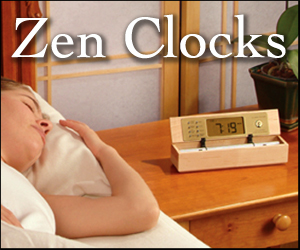 musical chime and gong alarm clocks by Now & Zen, Inc. Set Time Aside to Sleep!
Changing Your Life and Your Alarm Clock: Getting More Sleep Can Improve Your Health
By LARA SALAHI (@larasalahi1) and CHRISTINE BROZYNA
Amid the hustle of every day stress, there are some simple steps people can take to get a better night’s sleep.
“You need to set aside the time for sleep. You need a few hours to unwind before. It takes time for the brain to wind down,” said Dr. Charles Czeisler, professor of sleep medicine at Harvard Medical School.
At Northside Hospital Sleep Disorders Center Roberts was taught “sleep hygiene,” — a healthy routine that should be practiced before bed.
Also, choosing the right alarm clock can make all the difference in the world. The Zen Alarm Clocks with chimes is the perfect, peaceful solution. Invest in gentle and relaxing sleep tools like The Zen Alarm Clock or The Zen Timepiece with Tibetan-bowl gong!
 gong alarm clocks offer alternatives to jarring, loud alarm clocks Now & Zen Headquarter Store
1638 Pearl Street
Boulder, CO 80302
(800) 779-6383
Posted in Bamboo Chime Clocks, sleep, Sleep Habits
 sleep for well-being A good night’s rest can help you lose weight, beat depression, and ward off heart disease.
PEOPLE THINK sleep is a waste of time,” says James P. Krainson, M.D., director of the South Florida Sleep Diagnostic Center in Miami. “But they don’t realize that sleep will make them more productive.” It will also help you improve your memory, shed postpregnancy pounds, and stave off obesity, heart disease and diabetes. Dozens of studies support the notion that sleep is just as important for maintaining good health as diet and exercise. For example, a study published in the journal Sleep found a relationship between short sleep and increased diabetes risk. Other studies found a lack of sleep can exacerbate pain, cause mood disturbances, and even increase the risk of gum disease.
Your wake–up call
If results from a 2007 Sleep in America poll are anything to go by, too many women are risking their health from lack of sleep. Conducted by the National Sleep Foundation (NFS), last year’s poll revealed that 60 percent of American women get a good night’s sleep only a few nights per week or less. Apparently, when women are pressed for time–which, let’s face it, is every day—sleep is usually the first thing to go.
To help you get back in bed and waking up well rested we looked at two sleep ailments–and discovered some surprisingly effortless solutions.
THE PROBLEM: No time
Recent research at the University of Pennsylvania, published in 2007 in Sleep, says our work–driven culture keeps us from getting the rest we need. Among the findings: The more time we spend working and commuting, the less time we spend in bed. Even when we know that getting more sleep will make us feel better, it usually isn’t enough to keep us from burning the candle at both ends, says Michael Breus, Ph.D., sleep expert and author of Beauty Sleep: Look Younger, Lose Weight, and Feel Great Through Better Sleep (Plume, 2007). What’s required, Breus says, is a plan for making sleep a priority:
Set your clock for sleep
Set your Zen Alarm Clock with Chime to go off an hour before you want to go to sleep. The gentle Chime Alarm is your cue to start getting ready for bed.
Wind down for an hour Take 20 minutes to shut down the house for the night and prepare for the next morning. Spend the next 20 minutes doing your usual evening ablutions like washing your face, brushing your teeth, and changing into your pj’s. For the final 20 minutes, set your Meditation Timer with Chime for 20 minutes so that you can relax and meditate in bed. That’s it. No work, reading, e–mails, phone calls, paying bills, or getting into a discussion with your partner about your health, finances, or relationship during your power–down hour, says Breus. “Avoid any activity that gets your mind revved up before you go to bed,” he advises.
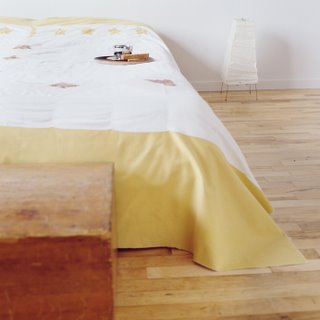 Create a Sleep Sanctuary Create a sleep sanctuary
“I’ve gone into bedrooms of people who say they can’t sleep, and they’ve got a computer in there, a TV, a huge pile of laundry on the floor,” says Breus. The question then becomes, according to Breus, not “Why can’t I sleep?” but “How could I sleep under these circumstances?” To transform your bedroom, Breus recommends moving the computer and the TV out of the room and clearing out the clutter. “You want to create an area that’s flowing and positiv; he writes in his book Beauty Sleep.
THE PROBLEM: Insomnia
Insomnia—from the Latin word for “sleepless” –is the most common sleep disorder, characterized by difficulty falling asleep, waking up in the middle of the night and not being able to fall back asleep, or waking up too early in the morning. For a clinical diagnosis, the lack of sleep must impair your daytime functioning, says Gregg D. Jacobs, Ph.D., sleep specialist at UMass Memorial Medical Center and founder of cbtforinsomnia.com. “Almost half of all adults have insomnia once a week,” he adds. But only a fraction of sufferers seek treatment, in large part, Jacobs says, “because they’re afraid their doctor will prescribe sleeping pills, and there is a growing belief that pills are not a good choice.” Try these drug–free solutions instead:
Retrain your brain for sleep
Cognitive behavior therapy (CBT) is a common psychological technique used to help people change the way they think and act and thereby break certain self–destructive habits. In two major studies in the Journal of the American Medical Association and one study in the Archives of Internal Medicine, cognitive behavior therapy proved to be more effective than sleeping pills, says Jacobs. “And unlike pills, CBT has no side effects and works long term.”
The CBT insomnia treatment program that Jacobs developed and tested at Harvard Medical School and UMass Medical Center (now online at cbtforinsomnia.com) involves five sessions over five weeks. It teaches insomniacs many techniques—like waking up at the same time every morning, including weekends; and when sleep doesn’t come within 30 minutes, getting up and doing something quiet and relaxing–that help people reform their sleep habits.
RESOURCES Check with the National Association of Cognitive– Behavioral Therapists Organization, nacbt.org, to find a practitioner.
Try melatonin
The same hormone that your body produces to induce drowsiness, melatonin, can be purchased overthe– counter in a pill form. Unlike valerian, “melatonin usually has an immediate effect,” says Wong.
BUYING GUIDE Look for Puritan’s Pride melatonin at puritan.com. DOSAGE Take 0.3 mg per day about 30 minutes to an hour before bedtime. “The recommendation on product bottles, 1 to 3 mg, is higher than many practitioners believe it should be,” says Wong. “There’s concern that too large a dosage could cause the body to reduce its own production of melatonin.”
 calming lavendar, aromatherapy for sleep Sniff lavender before bed
When 31 “healthy sleepers” aged 18 to 30 years in a Wesleyan University peer–reviewed study (published in 2005 in the journal Chronobiology International) sniffed lavender essential oil over the course of one half hour before bed, it increased the amount of time they spent in the most productive stages of sleep, and they reported feeling more rested the next day.
BUYING GUIDE Try Aura Cacia lavender oil at health food stores or natural markets or at auracacia.com.
DIRECTIONS “Put a few drops of lavender oil in a warm bath about an hour before bed,” suggests Wong. “A warm bath raises body temperature. When it falls after you get out, that drop causes you to feel drowsy.”
Boulder, Colorado—an innovative company has taken one of life’s most unpleasant experiences (being startled awake by your alarm clock early Monday morning), and transformed it into something to actually look forward to. “The Zen Alarm Clock,” uses soothing acoustic chimes that awaken users gently and gradually, making waking up a real pleasure.
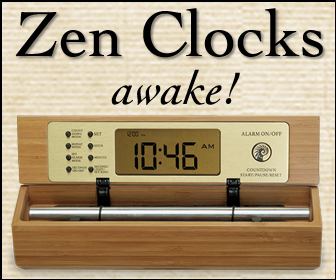 Gentle Chime Alarm Clock for a Progressive Awakening Rather than an artificial recorded sound played through a speaker, the Zen Clock features an alloy chime bar similar to a wind chime. When the clock’s alarm is triggered, its chime produces a long-resonating, beautiful acoustic tone reminiscent of a temple gong. Then, as the ring tone gradually fades away, the clock remains silent until it automatically strikes again three minutes later. The frequency of the chime strikes gradually increase over ten-minutes, eventually striking every five seconds, so they are guaranteed to wake up even the heaviest sleeper. This gentle, ten-minute “progressive awakening” leaves users feeling less groggy, and even helps with dream recall.
adapted from Natural Health Magazine
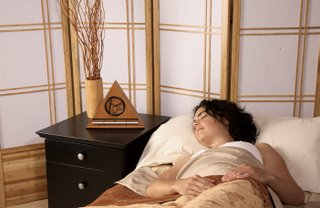 Wake up to the Zen Alarm Clock with Soothing Chime for a Progressive Awakening
Now & Zen’s Natural Chime Alarm Clock Shop
1638 Pearl Street
Boulder, CO 80302
(800) 779-6383
Posted in sleep, Sleep Habits, Well-being
 satisfy your spirit by creating a sleep oasis Create your sleep oasis with a mind/spirit component to satisfy your spirit. Discourage thoughts from continuing to churn at night by eliminating any sources of distraction, keeping work and stimulating entertainment (like TV and laptops) out of the bedroom. Rather than a thriller novel, grace the bedside with divinity: A small statue of the Buddha, Ganesha, Jesus, a revered saint, or other sacred figure can serve as a grounding, comforting presence, especially when paired with a natural element — a smooth stone, an acorn, a bowl of white sand. Alternatively, consider creating a bedside altar that honors the people you love, complete with small framed photographs and personal artifacts that reflect their spirit. With body, mind, and spirit thus cradled and protected, you can enter into sleep peaceful and complete.
Falling asleep is a natural progression into your body’s unconscious state. Using a Now & Zen alarm clock will progressively wake you up, mimicking your body’s natural waking process. Now & Zen alarm clocks come in a variety of styles to best compliment your sleep oasis.
Now & Zen Alarm Clocks adapted from Body + Soul Magazine, February 2006
 Alarm Clocks to Create a Sleep Oasis in Your Bedroom Now & Zen’s Clock Store
1638 Pearl Street
Boulder, CO 80302
(800) 779-6383
Posted in Natural Awakening, sleep, Sleep Habits, Well-being
 More exercise for better sleep A new study suggests regular physical activity might encourage better shut-eye: People who met national exercise guidelines reported better sleep and less daytime fatigue than those who didn’t.
The research doesn’t confirm that exercise directly leads to improved rest, and it’s possible there may be another explanation for the apparent connection between exercise and sleep. Still, the findings are mostly consistent with previous research, said Matthew P. Buman, an assistant professor of exercise and wellness at Arizona State University who’s familiar with the study.
But if you think a daily walk or jog will clear up your sleep problems, that might be a bit too optimistic.
“In general, the relationship between physical activity and sleep is moderate,” Buman said.
More than one-third of U.S. adults have trouble falling asleep at night or staying alert during the day, according to background information in the study. Inadequate sleep has been linked to depression, cardiovascular disease and other health problems.
The new study, led by researchers at Oregon State University, looked at statistics from a U.S. health survey conducted from 2005 to 2006. The researchers focused on more than 2,600 men and women — aged 18 to 85 — who measured their activity levels and answered questions about sleep.
All wore accelerometers, devices that measure physical activity, for a week.
The researchers adjusted their statistics so they wouldn’t be thrown off by unusually high or low numbers of people of certain ages, weight, health condition, smoking history or other factors.
 Wake up with gradual, beautiful acoustic chimes. The Zen Alarm Clock transforms your mornings and gets you started right, with a progressive awakening The researchers then determined how many participants met or exceeded national exercise guidelines by getting at least 150 minutes a week of moderate exercise or 75 minutes a week of vigorous exercise or a combination of both.
Those who met the guidelines were 65 percent less likely to report often feeling sleepy during the day compared to those who got less exercise. They were also 68 percent less likely to report sometimes having leg cramps and 45 percent less likely to report having trouble concentrating while tired.
The study appears in the December issue of the journal Mental Health and Physical Activity.
Buman called the finding intriguing, even if it doesn’t prove that exercise improves sleep.
If that is the case, however, the causes are unclear. Some researchers think physical activity improves sleep by helping reduce levels of stress, anxiety and depression, he said. “Others have suggested an energy conservation hypothesis, essentially saying that when you burn more calories through exercise, your body more efficiently uses the sleep period to recover. Others have suggested that exercise can modestly reduce body weight, which in turn helps people to sleep better.”
Another theory suggests that exercise helps the body deal better with the cooling down of its temperature during sleep, he said.
So should you avoid exercising before bed, as conventional wisdom suggests? The new research doesn’t look at the timing of exercise, but the study authors do note that most previous studies haven’t shown that late-night exercise disrupts sleep quality.
Study co-author Brad Cardinal, a professor of exercise science at Oregon State, said in a statement that the study is unusual because it directly measured how much exercise people got instead of relying on their memories, which can be faulty.
More information
The U.S. National Library of Medicine has details on sleep disorders.
The Zen Clock’s long-resonating Tibetan bell-like chime makes waking up a beautiful experience – its progressive chimes begin your day with grace. When the clock’s alarm is triggered, the acoustic chime bar is struck just once … 3-1/2 minutes later it strikes again … chime strikes become more frequent over 10 minutes … eventually striking every 5 seconds until shut off. As they become more frequent, the gentle chimes will always wake you up – your body really doesn’t need to be awakened harshly, with a Zen Clock you’re awakened more gradually and thus more naturally. Unlike artificial recorded sounds coming out of a tiny speaker in a plastic box, natural acoustic sounds transform your bedroom or office environment.
 Waking up in the morning should be as pleasant as falling asleep at night. The Zen Alarm Clock's gradual, gentle awakening is transformative. Now & Zen – The Gentle Sounds Alarm Clock Store
1638 Pearl Street
Boulder, CO 80302
(800) 779-6383
orders@now-zen.com
Posted in sleep
« Previous Page — « Previous Entries
Next Entries » — Next Page »
|
|
|
|